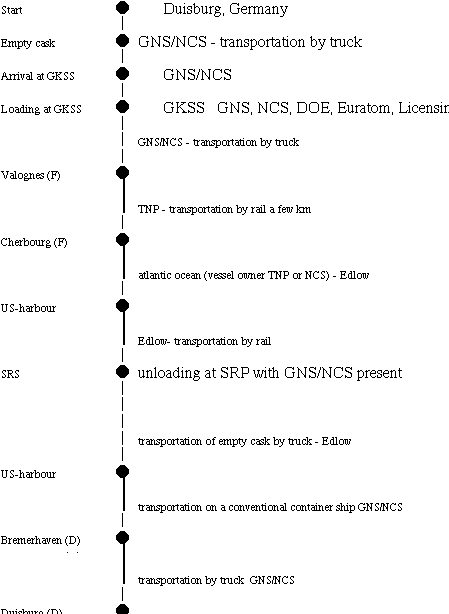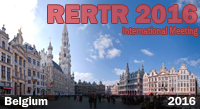IAEA/USA Interregional course on
Preparations to Ship Spent Nuclear Fuel (1997)
Shipment of Spent Fuel
of the FRG-1 Research Reactor
![]() PDF version available
PDF version available
DOWNLOAD full paper in PDF format.
Contact:
Dr. Wilfried Krull
GKSS-Forschungszentrum Geesthacht
Max-Planck-Strasse
D-21502 Geesthacht
Germany
Tel.: +49-4152 87 12 00
Fax: +49-4152 87 13 38
E-mail: [email protected]
IAEA/USA Interregional Training Course
Technical and Administrative Preparations Required for Shipment of Research Reactor Spent
Fuel to its Country of Origin
13-24 January 1997
Argonne, IL
Shipment of Spent Fuel
of the FRG-1 Research Reactor
W. Krull
GKSS-Forschungszentrum Geesthacht GmbH
Max-Planck-Straße
D-21502 Geesthacht
Shipment of Spent Fuel of the FRG-1 Research Reactor
1 Pre-Shipment Considerations
1.1 Starting Point
1.2 Conclusion for GKSS
2 Shipment of Spent Fuel
2.1 DOE
2.2 Euratom Supply Agency
2.3 Euratom Control Agency
2.4 Paris Convention
2.5 Cask Selection
2.6 Transportation Company
2.7 Export License
2.8 Nuclear Liability Coverage
2.9 Transportation License
2.10 Licensing Authority of the Research Reactor
2.11 Transportation Planning
2.12 Operator
2.13 Customs
2.14 Special Duties
2.15 Finally
1 Pre-Shipment Considerations
1.1 Starting point
The operator is sitting on a large number of spent fuel elements. He has to look for solutions!
A) Continouing storage questions:
- storage at site or away from the site
- storage conditions
- wet or dry
- increase capacity or not
- for what period of time
- is there a solution in sight for getting rid of the fuel at a later date
- surveillance program
- programs to handle corroded (defect) fuel elements
- look for interim (up to 100 a) storage
B) Reprocessing: AEA (Dounreay), Cogema (Cap La Hague), Technabsexport (Mayak)
questions:
- waste return clause
- price for reprocessing
- price for storage of spent fuel, waste, reprocessed fuel and for what time
- price for final disposal of waste
- price for conversion of fuel to usable material (U-metal, U 3 O 8 , UO 2 or?)
- price for transportation of spent fuel, waste, reprocessed U
- conditions of the waste acceptable or not acceptable for interim storage and especially for final disposal
- take back possibilities for U and waste
- where to store the waste
- where to dispose the waste
- what to do with reprocessed fuel
- permission from country of origin of U or enrichment needed
C) US take back policy questions:
- material of US origin (enrichment)
- out of core before May 12, 2006
- shipped before May 12, 2009
- low income country no charge for everything
- others paing for everything
D) Other solutions offered from countries of origin of the enriched material
similar to C)
questions:
- Russia, UK, China, France etc.
- no other country is in sight offering similar conditions like US
E) Operation after May 12, 2006
Help yourself. No other country is or will be with you. The IAEA may offer assistance. But assistance does not solve the problem. It makes you only aware that there is a big problem
Help yourself than God is with you!
F) Are other countries willing to reduce proliferation risk questions:
- RERTR is going slowly
- US take back policy is an extremely encouraging signal
- losing self protection (< 1 Sv/h in 1 m in air) is being handled with extremely reduced efforts. A problem the international community is not able to solve today. This problem is well known as we have been told that countries were trying to use such material for the construction of atomic weapons.
1.2 Conclusion for GKSS
As none of these alternatives gives fully long term confidence and solutions we decided as follows:
a) continouing storage
- as much storage capacity at the site as possible
- cooperating with the German initiatives to develop a dry intermediate storage cask for storage _ 40 years
- substituting the initiatives for getting an interim storage license at Ahaus facility
- cooperating and substituting work for final disposal
b) reprocessing
- AEA (Dounreay) - sending 132 spent fuel elements in 1993 for reprocessing to increase empty storage space. Continouing discussions til spring 1996 for future reprocessing campaigns
- Cogema (Cap La Hague) - Discussing intensively this solution with Cogema
- Technabsexport (Mayak) - This alternative does not exist at the moment
c) US take back policy
If this offered policy will continue to be in force up to 2006 (2009) GKSS will take this alternative. We shipped in 1996 already 33 spent HEU fuel elements and we intend to ship in 1997 all spent HEU fuel elements and some first spent LEU fuel elements.
d) other solutions
There are none
e) operation after May 12, 2006
GKSS intend to operate its 5 MW FRG-1 at least for an additional 15 years. This means up to the year 2010. Therefore we need other solutions which can be
- alternative a) or
- alternative b) (probably Cogema)
f) We converted our FRG-1 many years ago from 93 % to 20 %
Therefore
Having got the EIS and ROD from DOE we made up our mind and decided to take the US option now and starting the preparation for the shipment to the US DOE Savannah River Site just after the ROD has been published.
2 Shipment of Spent Fuel
2.1 DOE
- Environmental Impact Statement (EIS) published March 1996
- Record of Decision (ROD) published May 1996
- Discussion of the Reliability of the ROD for 10 years period in Germany and with DOEMeeting May 1996
- Asking for contract and contract negotiations Draft versions exist in May 1996
Contract negotiations May/June 1996
Internal approval within DOE July 1996
Contract on hand early July 1996, signed by DOE and has to be co-signed by GKSS and Euratom Supply Agency (middle of July)
- Appendix A (fuel data)
Available in May from SRS
Filled in Appendix A handed to DOE (SRS) end of May (normally at least 180 d in advance)
- Answering questions on the appendix A material (July / August)
- Discussion on the probable shipping date and fixing the shipping date to August 23, 1996
- Import clearance - middle of July
Necessary document to apply for an export license (at least 4 weeks). This import clearance must be signed by an US-Government organization and clearly identify the kind of material to be accepted for import.
There exist a standard form developed by the Department of Commerce which should be use and has not been used til now.
- Agreeing on the date of cask loading to allow DOE inspectors to be present (early August)
- Getting specifications how to send a water sample from the storage pool to DOE shortly before loading the fuel. Clarifying these specs, sending the sample by express mail (cooled boxes, middle of August) and waiting for analysis results till now.- Having the DOE-inspectors at the site viewing the loading, taking video tapes and photos and measuring the Cs-137 concentration in water samples from the loaded cask
a) floaded cask without water
b) resh demineralized water filled into the cask
- sample 1
b) waiting 4 hours
- sample 2
Counting rate sample 2 minus counting rate sample 1 must be below a given value to state that the fuel is intact (not defined as defect)
- US - DOE - SRS
Changes date from August 23 to August 30 for shipping the fuel from Cherbourg to US
- Authorization to ship
Received 1 day before the truck must leave the reactor site to catch the ocean vessel. We have been informed by a strong worded letter before getting the authorization that SRP may not accept the fuel if it is being transported before having the authorization on hand.
- Sending loading informations e.g. contamination control, loading scheme etc. to DOE by fax
- DOE stops the ship from Europe at the high seas for some days to join with a vessel from South America
- Giving Euratom seals identification numbers to DOE
- Try to arrange additional shipments
2.2 Euratom Supply Agency (Brussels)
- Co-signer of the contract
- Getting a code to be used for this shipment for identification of the fuel
2.3 Euratom Control Agency (Luxemburg)
- Advance notification of the intention to ship including quantity of fuel, date etc.
- Agreement on the date of sealing the casks
- Sealing the casks
- Getting seals identification number to be sent to DOE
- Detailed notification on the fuel being shipped
2.4 Paris Convention November 16, 1982
- Article 4c of this convention demands that the operator has to provide the shipper with a document containing
a) nuclear liability coverage
b) declaration of the authorities that the operator is the legal owner of the nuclear facility (this part is not understandable to me)
- Necessary for Germany, Austria, Belgium, Denmark, Spain, France, Greece, Italy, Luxemburg, Norway, Netherlands, Portugal, UK, Sweden, Switzerland, Turkey
2.5 Cask Selection
- Max. crane load (16 tons) at GKSS site, cask weight
- Cask capacity
- Cask availability
- Cask and basket licensed (valid) for the whole trip and for the fuel to be shipped (Germany, France (?), USA) The validation for France has been available two days before the delayed shipping takes place. The cask validation from US was on hand a few days earlier. Especially with France it has been very difficult.
- Price
- Time necessary for cask loading responsible reactor shut down time e.g. if you need a transfer cask there may be additional shut down time, space and licensing necessary
- Cask lifting equipment licensed
- Last inspection records of the cask and the cask lifting equipment are on hand and still valid.
2.6 Transportation Company
- With the cask selection normally the transportation company is being selected
- Operation and inspection manuals and records have to be handed over
- In former days the transportation company has been responsible for the whole shipment. These days the responsibility is being split in many portions to allow more companies to be included. For the actual shipment GNS, NCS, Transnucleaire, Edlow. This makes the live not easier and the costs not smaller.
- GNS (cask owner) and NCS were forming a consortium but not informing the customers upon this situation and it is still not clear to me how the duties and responsibilities are being shared.
- Contract with GNS has been signed including loading the cask, unloading of the cask, transportation of the empty cask to GKSS and from US-harbour back to Germany, transportation of the loaded cask to Valognes
- Contract with Edlow was being signed including transportation from Valognes to Cherbourg (TNP), atlantic ocean (IMCO II vessel), US-harbour to SRP and retour.
Remark: Two vessels meeting IMCO II demands are on the market. For commercial
reasons only one should be used for the shipment of 6 casks (ROD allows 8 casks!).
TNP got the job and NCS got a fee (!)
2.7 Export License (Bundesamt für Wirtschaft)
- Takes at least 4 weeks
- Application must include signed contract with DOE, import certificate, spent fuel details including values of Pu isotopes
- Have to ask Federal Ministry on Environmental Protection (responsible for reactor safety) for approval
- Valid only four months (up to December 31, 1996)
- At least 14 d after shipment a written information upon the shipment including exact data must be sent.
2.8 Nuclear Liability Coverage
- This coverage must be valid and the amount large enough to cover the different demands for the whole route (surprises are possible)
- This coverage is taken over (cost free) by the funding organizations. In the case of GKSS we need 5 contracts for the following percentage
a) Federal Government 90 %
b) State of Schleswig-Holstein 4 %
c) State of Hamburg 2,5 %
d) State of Lower-Saxony 2,5 %
e) State of Bremen 1 %

2.9 Transportation License
- For the actual shipment a license must be on hand given by "Bundesamt für Strahlenschutz". The license includes description of the material, detail on routing (e.g. Autobahn A 25 from here to there, than Autobahn A 1 to ... etc), dates (hours!), truck license numbers, name of drivers, physical protection details etc.
- demand to inform all involved states in Germany at least 72 hours in advance and at that moment when the truck is leaving the facility
2.10 Licensing Authority of the Research Reactor
- Operator has to inform the authority at least 5 working days in advance
- A member of this authority is coming in advance looking for the validity of papers: cask license, license of cask lifting equipment, validity of cask and loading equipment inspection records, export license, materials description etc.
- Surveying loading procedure
2.11 Transportation Planning
- Arrival date at US-harbour accepted by US-DOE and US-Navy
- Availability of trucks, railways, ocean vessels
- Continuous surveying of the total transport by physical protection control e.g. no con- trol in France overnight (10 pm to 6 am). Therefore trucks have to be stored overnight at a secured place (e.g. Nuclear Research Centre Saclay)
- Route planning must include arrival of trucks from different locations within a few (3) hours at Valognes to be loaded on a railway. Note no loading from Friday afternoon to Monday morning at Valognes (!) - no working hours?
- Railway transport for only a few km from Valognes to Cherbourg.
This planning has been made by TNP, Edlow. I am not able to see a reason for this railway transportation as normally trucks can load directly on board of that dedicated vessel as it is being practice at other nuclear shipments.
- Arrival date in the US has been coordinated by shippers and decided by US-DOE and mainly US-Navy to have the shipment from Europe plus South America arrived there at the same day.
- Coordination necessary between
Operators (cask loading and cask departure), GNS/NCS, TNP, Edlow, US-DOE, US-Navy
At least five different schedules have been made - were necessary (sometimes confusing and not easy to understand)
2.12 Operator
- The operator is involved directly in most of the activities described above and within the other activities he is being involved indirectly as his shipment is depending on that activities and he must be informed.
- First of all before considering the shipment the operator must look for the funds for those whole activities (some are free of charge e.g. export license, activities of the license authority, customs clearance). The rest he has to pay for and the amount is large (millions of US $).
2.13 Customs
- German customs export approval must be on hand. Given normally not earlier than 1 working day in advance. Export license, fuel data, transportation license etc. must be presented.
2.14 Special Duties
- Cutting fuel elements especially control fuel elements if they are not fitting into e.g. the GNS-11 cask. This procedure has to be licensed separately and is being inspected by the consultants of the licensing authority.
2.15 Finally
It works and the operator pays for all or everything. Therefore shipments can (not should) be complicated, time consuming, not optimal organized etc. This only cares the operator who is at the end happy to have his fuel shipped.




